Chapter 1: Death Stalks the Border | Chapter 2: Economic Obstacles in Mexico | Chapter 3: Earning a Living in Mexico
In the small town of Emiliano Zapata, farmers struggle to find a viable way to get their fruit to market. Meanwhile, much of it rots on the ground. A plan to build a processing plant may hold the key to their future.
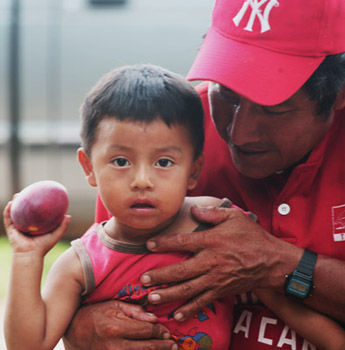 |
By David Kempa
EMILIANO ZAPATA, Campeche, Mexico — In the winter of 2007, Ruben Ku Poot’s son fell ill.
The boy, 2-month-old Abraham, coughed and wheezed and seemed at times unable to take a breath.
Ku Poot lives in Emiliano Zapata, an impoverished farming town of no more than 500 people in the Tenabo municipality of Campeche, a southern state located on the Gulf of Mexico. Few houses in the village have glass windows, furniture is limited to hammocks and most of the farmers still seed their land by hand.
Residents are used to doing without.
So when he took his son to the town medical clinic, Ku Poot was not surprised when the staff told him there was nothing they could do, that he needed to take Abraham to the hospital in the city of Campeche, a 45-minute drive away.
Abraham spent two months in the Campeche hospital, connected to tubes and complex equipment. It seemed to Ku Poot that the boy grew no better or worse -– that he merely hung on to life for 60 days straight.
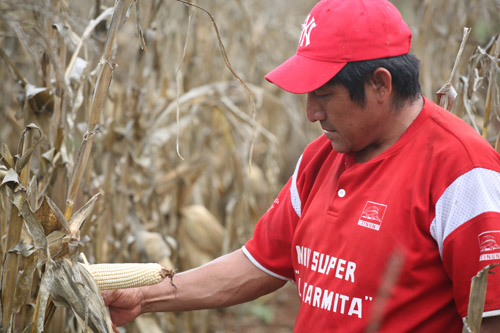
Ku Poot spent every night at the hospital. Although he had two older children and 10 hectares of land to farm, he couldn’t bring himself to leave his youngest son’s side. Each night he would watch Abraham struggle to breathe, and he would worry.
“I said, ‘I don’t see any change. Something, something, something is wrong.’”
Abraham was diagnosed with subglottic stenosis, a condition in which the narrowest, least expandable part of the airway is narrower than it ought to be. The Campeche doctors decided that Abraham should undergo surgery 120 miles away in Merida, in the neighboring state of Yucatan. He was to have a tracheal tube inserted into his throat to help him breathe.
This is when Ku Poot met Juan Manuel Cardona Chable –- the man who would change not only the lives of Ruben and Abraham Ku Poot but also the entire town of Emiliano Zapata.
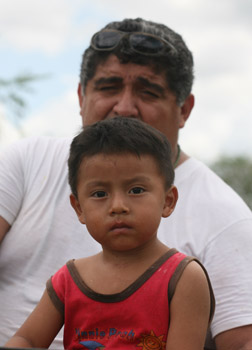
* * *
Two miles east of Emiliano Zapata there is a side road blocked by a locked gate. Behind the gate is the newest of the townspeople’s farmland.
Because the vast majority of Emiliano Zapata residents are of Mayan descent, they mainly harvest traditional crops such as maizand calabasa.
But the land behind the gate is different.
Thousands of lush trees loaded with fruit –- lemon, lime, orange, mango and papaya -– reach toward the Mexican sky. The papaya trees glisten bright green under the Yucatan sun, and the lemon tree branches bow under impressive burdens. Virtually all of this fruit is 100 percent organic, untreated by chemicals of any kind.
And virtually none of it will ever be eaten.
* * *
A small, gray Chevy S10 pickup truck pulled up alongside a field of mango trees. As the engine died, six people stepped down from the vehicle and began to amble through the orchard, careful not to step on the scores of overripe mangos that have fallen from the trees.
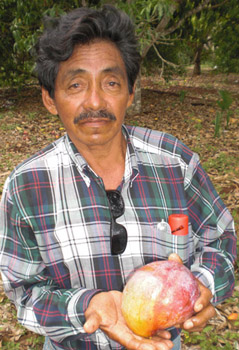
Jesus Hernandez Arias placed his hand against the trunk of a nearby tree as he explained why the residents of Emiliano Zapata have not been harvesting the vast majority of these crops.
There is no local market for this fruit, he said, and if there were a demand for it elsewhere, the residents would neither know how to find it nor how to transport it and still pull in a profit.
Hernandez knows the problem well: He has much experience working with coffee growers in southern Mexico who also have trouble finding markets for their product.
He estimated that 80 percent to 90 percent of the area’s mangos –- about 15 metric tons — are lost each year because there is no place to sell them. Farmers do better with the lemons, but nearly as many oranges as mangos are wasted for the same reason.
“And some 80 percent of papaya,” added Hernandez’s friend Juan Cardona, cutting a slice from a ripe mango with his pocketknife.
The fruit the townspeople do manage to sell, Ku Poot said, goes to coyotes -– brokers with the means to refrigerate the produce and transport it to distant markets. Generally, they pay next to nothing for the fruit and resell it for handsome profits.
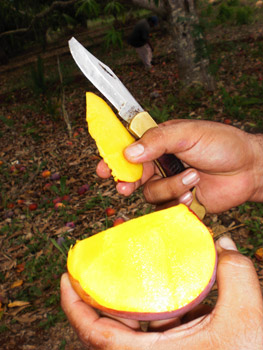
The project these men have in mind will change all that and in the process transform Ku Poot’s humble town.
Hernandez and Cardona are working with an international nonprofit organization called AGIRabcd to build a factory that will turn local produce into juice and export it –- they don’t yet know where. AGIRabcd, based in Paris, France, is powered by retired and semi-retired professionals who offer their skills to projects in developing countries.
The factory they hope to build is to be owned and operated by local farmers. To find markets for the juice, organizers hope to take advantage of the 9-year-old free trade agreement between Mexico and the European Union that has eliminated or steadily reduced tariffs on agricultural exports of tropical fruits, vegetables, concentrated juices and honey.
While a factory may not be exactly what the people of Emiliano Zapata had in mind when they planted the trees, it would fulfill one of their dreams, Ku Poot said as he picked up his son, who bears a circular scar on his throat.

“Our grandparents,” he said, “planted these as seedlings so we could live better.”
* * *
Ku Poot was born in Emiliano Zapata but moved to the city of Campeche as a young man to pursue a degree in biochemical engineering. Soon after graduating, he realized there was no demand in Campeche for someone with his skills, so he moved back home and started to farm once again.
When his son Abraham fell ill, Ku Poot used all of his savings to pay the medical bills, but he was unable to cover everything.
In the middle of this nightmarish journey, Ku Poot met Cardona, who was working for Desarrollo Integral de la Familia, Mexico’s department of social services. Cardona came to inform Ku Poot of his options for state assistance, and the two became friends.
Before long, Cardona could often be found in Emiliano Zapata, socializing with farmers and eating in the open-air kitchen at Ku Poot’s father-in-law’s home.
One day, Ku Poot brought Cardona out to the Emiliano Zapata orchards. Cardona, marveling at all of the perfectly edible fruit that would never be picked, could hardly believe that the orchards’ owners could live in such an impoverished town. That’s when he called his friend Jesus Hernandez.
* * *
Sitting in a hammock in his living room, Ku Poot spoke quietly about how he made it through his son’s illness. He talked about how his extended family took in his two other children while he and his wife were away, how they harvested his crops for him while he sat in a hospital waiting room.
He recalled how his wife changed Abraham’s tracheal tube every three hours once the family finally returned home from the hospital. He fell silent for a moment.
“Every three hours,” he repeated.
He continued to speak about all the things his family had done for him through his son’s illness, and suddenly remembered a recent moment when he had been sitting alone with Cardona.
“You’ve taught me something that I once had, and lost,” Cardona said to him.
“What was that?” asked Ku Poot.
“That family is the most important thing there is.”
* * *
The story of Emiliano Zapata’s agrarian reform is far from over. The farmers still need to organize and agree on how to operate a cooperative juice factory, and AGIRabcd representatives have yet to sign the papers granting the money to build it.
But if the story is to end happily -– if the factory is to be built and Emiliano Zapata’s dream of agrarian reform is to come true -– a sick child may be to thank.
If Abraham had never gotten sick, his father would have never met Juan Cardona, who would never have seen the spectacle of ripe, untouched fruit and contacted Jesus Hernandez and informed him of these the astounding opportunity.
And these words by Hernandez might never have rung so true: “Family unity is what makes society. If there’s no family, there’s no society.”
Chapter 1: Staring Down Death In the Desert | Chapter 2: Led By the Children | Chapter 3: The Fruits of Their Labors














